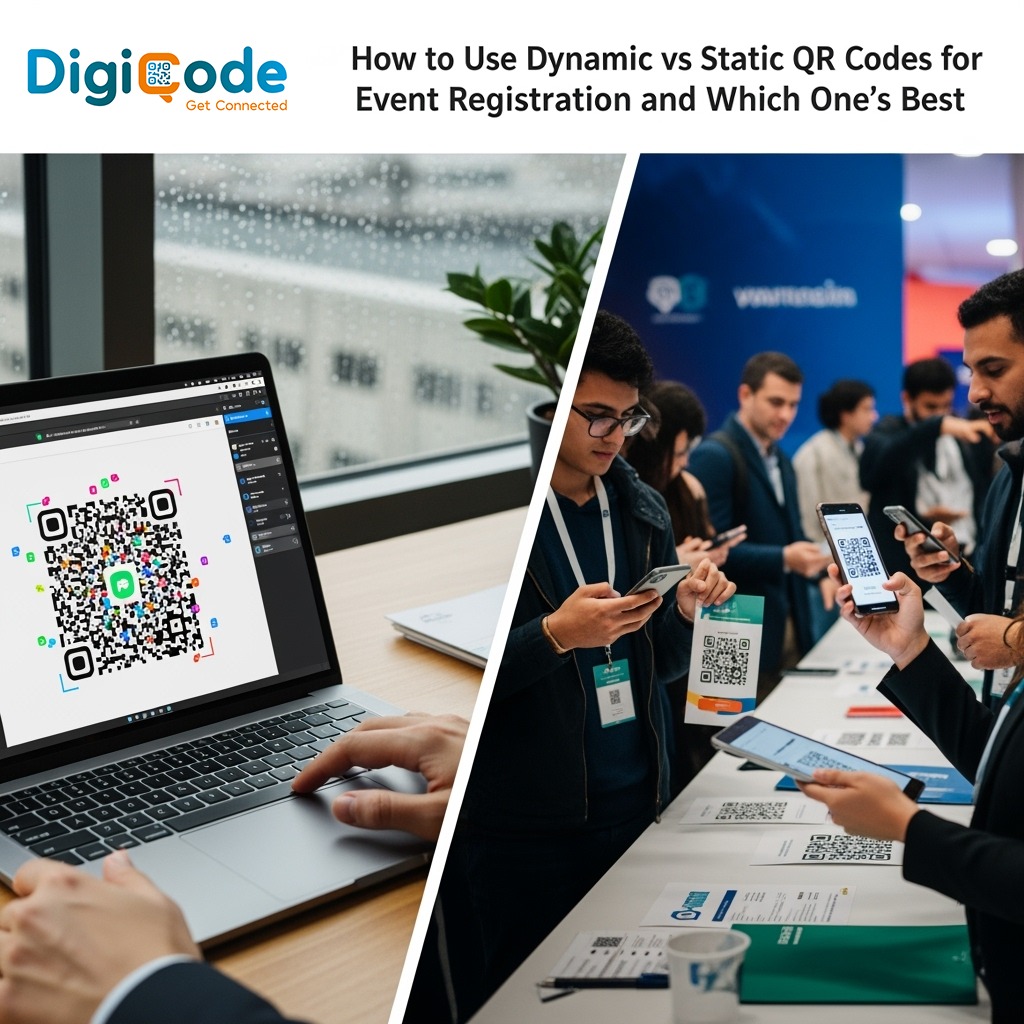
How to Use Dynamic vs Static QR Codes for Event Registration (and Which One’s Best)
Category: QR Code Generator
Event registration has changed a lot over the past few years. Gone are the days of paper tickets and long queues. Today, most organizers use QR codes for events because they’re quick, safe, and easy for both hosts and guests. But here’s where many organizers get stuck - whether they should use static QR codes or dynamic QR codes for registrations? The answer depends on the size of your event, the flexibility you need, and the kind of experience you want your guests to have.
Static QR Code
A static QR code is the simplest form. It stores fixed information, like a link to your event page or a PDF with details. Once generated, it can’t be changed. If you put the wrong link or your event details change, the code becomes useless.
Static QR codes are best for very small events where nothing is likely to change. For example, if you’re hosting a one-day local workshop and all you need is a QR code for event promotion on a poster that takes people to a registration page, a static code works fine. The downside is you don’t get any tracking. There’s no way to know how many people scanned it or where they came from.
Dynamic QR Code
Dynamic QR codes, on the other hand, are editable. They don’t store the information directly; they redirect through a short link, which means you can update the destination anytime. If your venue changes or you want to switch from one registration form to another, you can do that without making a new QR code.
Another big plus is tracking. With dynamic QR codes for events, you can see scan analytics like how many people scanned, when they scanned & sometimes even the location. This gives organizers real insight into engagement before the event starts. These codes are more suited for professional setups like conferences, exhibitions, or concerts where changes are common & analytics matter.
Static vs Dynamic QR Codes for Event Registration
Here’s a quick comparison to make things clear:-
- Editability - Static QR codes cannot be changed once created. Dynamic QR codes can be updated anytime without generating a new code.
- Analytics - Static QR codes do not provide any tracking. Dynamic QR codes let you see scan data, such as the number of scans and user activity.
- Use Case - Static QR codes are best for small, fixed events. Dynamic QR codes are ideal for larger or recurring events where details may change.
For eg., imagine you are planning a 3-day summit. With a static QR code, if the schedule changes, you’ll have to reprint everything. With a dynamic code, you simply update the link, and attendees still use the same QR code for event registration without any confusion.
How Organizers Can Use QR Codes for Registration
QR codes can be used at different stages of an event, not just during sign-ups. Some common ways to use them include:-
- Promotions - Add QR codes to posters, flyers, or social media for quick registrations
- Emails & Invites - Include QR codes in email campaigns for easy RSVP and sign-ups
- On-Site Check-in - Use a QR code for event check-in as entry passes to speed up the process
- Payments - Link QR codes to ticket purchase or payment gateways. Attendees can use a QR code for event tickets to directly complete their purchase
- Post-Event Engagement - Share feedback forms, brochures, or thank-you notes through QR codes
Choosing the Right Option
When to Use-
- Static QR Codes - Best for small events with fixed details, like a one-day workshop. Since the code cannot be changed once generated, it only works well if there are no chances of updates
- Dynamic QR Codes - Ideal for professional & large-scale events such as conferences, exhibitions & concerts. They allow organizers to edit event details anytime & track scans to measure attendee engagement
- Decision Point - If your event is simple & unchanging, static QR codes are sufficient. But if flexibility, analytics & scalability matter, dynamic QR codes are the smarter and more reliable choice
Why a Good Generator Matters
At the end of the day, whether you decide to go with static or dynamic QR codes, the real impact comes from the generator you trust. At Digi QR Code Generator, we believe the success of your event starts with the right tool. That’s why we’ve built a platform where you don’t have to choose between static or dynamic QR codes. You get both, completely free. With us, you can design QR codes that reflect your event’s branding, making every interaction look professional & seamless.
What makes us different is the control we give you. With our dynamic QR codes, you can change details anytime, see who scanned through analytics & handle everything in one place. This helps you save time, stay in control & give your guests a smooth and professional experience.
It’s no surprise that organizers trust us as one of the most reliable & effective event QR code generators. For us, it is not just about codes, it's about helping you run events that feel effortless, professional & truly impactful.
FAQs
Q1. What’s the main difference between static & dynamic QR codes?
Ans. Static codes are fixed and can’t be edited. Dynamic codes can be updated anytime and allow tracking
Q2. Why are dynamic QR codes better for big events?
Ans. They let organizers update event details instantly and provide analytics to measure engagement
Q3. Can I create both static and dynamic QR codes for free?
Ans. Yes, with a free QR code generator for events like Digi QR Code Generator, you can create and customize both without extra cost